51 start with M start with M
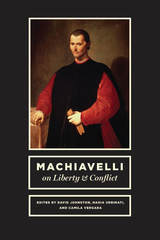
With Machiavelli on Liberty and Conflict, David Johnston, Nadia Urbinati, and Camila Vergara have brought together the most recent research on The Prince, with contributions from many of the leading scholars of Machiavelli, including Quentin Skinner, Harvey Mansfield, Erica Benner, John McCormick, and Giovanni Giorgini. Organized into four sections, the book focuses first on Machiavelli’s place in the history of political thought: Is he the last of the ancients or the creator of a new, distinctly modern conception of politics? And what might the answer to this question reveal about the impact of these disparate traditions on the founding of modern political philosophy? The second section contrasts current understandings of Machiavelli’s view of virtues in The Prince. The relationship between political leaders, popular power, and liberty is another perennial problem in studies of Machiavelli, and the third section develops several claims about that relationship. Finally, the fourth section explores the legacy of Machiavelli within the republican tradition of political thought and his relevance to enduring political issues.

“A most remarkable achievement.”—Felix Gilbert, Renaissance Quarterly

“A most remarkable achievement.”—Felix Gilbert, Renaissance Quarterly
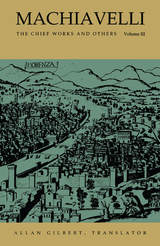
Allan Gilbert is unquestionably the most accurate and reliable translator of Machiavelli into English; the publication of this edition is an altogether happy occasion. Students of the history of political thought owe a particular debt of gratitude to Allan Gilbert.”—Dante Germino, The Journal of Politics
“A most remarkable achievement.”—Felix Gilbert, Renaissance Quarterly
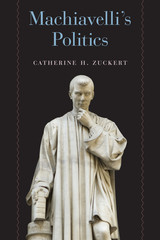
Starting with Machiavelli’s two major political works, Zuckert persuasively shows that the moral revolution Machiavelli sets out in The Prince lays the foundation for the new form of democratic republic he proposes in the Discourses. Distrusting ambitious politicians to serve the public interest of their own accord, Machiavelli sought to persuade them in The Prince that the best way to achieve their own ambitions was to secure the desires and ambitions of their subjects and fellow citizens. In the Discourses, he then describes the types of laws and institutions that would balance the conflict between the two in a way that would secure the liberty of most, if not all. In the second half of her book, Zuckert places selected later works—La Mandragola, The Art of War, The Life of Castruccio Castracani, Clizia, and Florentine Histories—under scrutiny, showing how Machiavelli further developed certain aspects of his thought in these works. In The Art of War, for example, he explains more concretely how and to what extent the principles of organization he advanced in The Prince and the Discourses ought to be applied in modern circumstances. Because human beings act primarily on passions, Machiavelli attempts to show readers what those passions are and how they can be guided to have productive rather than destructive results.
A stunning and ambitious analysis, Machiavelli’s Politics brilliantly shows how many conflicting perspectives do inform Machiavelli’s teachings, but that one needs to consider all of his works in order to understand how they cohere into a unified political view. This is a magisterial work that cannot be ignored if a comprehensive understanding of the philosopher is to be obtained.
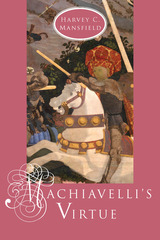
"The book brings together essays that have mapped [Mansfield's] paths of reflection over the past thirty years. . . . The ground, one would think, is ancient and familiar, but Mansfield manages to draw out some understandings, or recognitions, jarringly new."—Hadley Arkes, New Criterion
"Mansfield's book more than rewards the close reading it demands."—Colin Walters, Washington Times
"[A] masterly new book on the Renaissance courtier, statesman and political philosopher. . . . Mansfield seeks to rescue Machiavelli from liberalism's anodyne rehabilitation."—Roger Kimball, The Wall Street Journal
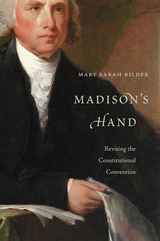
Winner of the Bancroft Prize
Winner of the James Bradford Best Biography Prize, Society for Historians of the Early American Republic
Finalist, Literary Award for Nonfiction, Library of Virginia
Finalist, George Washington Prize
James Madison’s Notes on the 1787 Constitutional Convention have acquired nearly unquestioned authority as the description of the U.S. Constitution’s creation. No document provides a more complete record of the deliberations in Philadelphia or depicts the Convention’s charismatic figures, crushing disappointments, and miraculous triumphs with such narrative force. But how reliable is this account?
“[A] superb study of the Constitutional Convention as selectively reflected in Madison’s voluminous notes on it…Scholars have been aware that Madison made revisions in the Notes but have not intensively explored them. Bilder has looked closely indeed at the Notes and at his revisions, and the result is this lucid, subtle book. It will be impossible to view Madison’s role at the convention and read his Notes in the same uncomplicated way again…An accessible and brilliant rethinking of a crucial moment in American history.”
—Robert K. Landers, Wall Street Journal
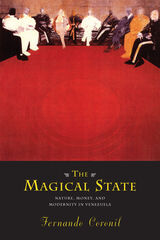

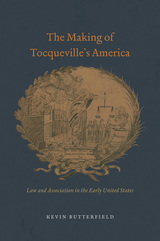
Butterfield explains that the first generations of American citizens found in the concept of membership—in churches, fraternities, reform societies, labor unions, and private business corporations—a mechanism to balance the tension between collective action and personal autonomy, something they accomplished by emphasizing law and procedural fairness. As this post-Revolutionary procedural culture developed, so too did the legal substructure of American civil society. Tocqueville, then, was wrong to see associations as the training ground for democracy, where people learned to honor one another’s voices and perspectives. Rather, they were the training ground for something no less valuable to the success of the American democratic experiment: increasingly formal and legalistic relations among people.

Walter Berns's Making Patriots is a pithy and provocative essay on precisely this paradox. How is patriotism inculcated in a system that, some argue, is founded on self-interest? Expertly and intelligibly guiding the reader through the history and philosophy of patriotism in a republic, from the ancient Greeks through contemporary life, Berns considers the unique nature of patriotism in the United States and its precarious state. And he argues that while both public education and the influence of religion once helped to foster a public-minded citizenry, the very idea of patriotism is currently under attack.
Berns finds the best answers to his questions in the thought and words of Abraham Lincoln, who understood perhaps better than anyone what the principles of democracy meant and what price adhering to them may exact. The graves at Arlington and Gettysburg and Omaha Beach in Normandy bear witness to the fact that self-interested individuals can become patriots, and Making Patriots is a compelling exploration of how this was done and how it might be again.

Making the Forever War brings Young's articles and essays on American war together for the first time, including never before published works. Moving from the first years of the Cold War to Korea, Vietnam, and more recent "forever" wars in Iraq and Afghanistan, Young reveals the ways in which war became ever-present, yet more covert and abstract, particularly as aerial bombings and faceless drone strikes have attained greater strategic value. For Young, U.S. empire persisted because of, not despite, the inattention of most Americans. The collection concludes with an afterword by prominent military historian Andrew Bacevich.
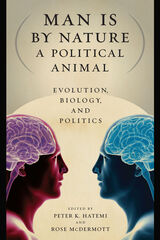
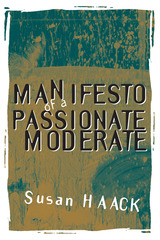
"The virtue of Haack's book, and I mean virtue in the ethical sense, is that it embodies the attitude that it exalts. . . Haack's voice is urbane, sensible, passionate—the voice of philosophy that matters. How good to hear it again."—Jonathan Rauch, Reason
"A tough mind, confident of its power, making an art of logic . . . a cool mastery."—Paul R. Gross, Wilson Quarterly
"Few people are better able to defend the notion of truth, and in strong, clear prose, than Susan Haack . . . a philosopher of great distinction."—Hugh Lloyd-Jones, National Review
"If you relish acute observation and straight talk, this is a book to read."—Key Reporter (Phi Beta Kappa)
"Everywhere in this book there is the refreshing breeze of common sense, patiently but inexorably blowing."—Roger Kimball, Times Literary Supplement
"A refreshing alternative to the extremism that characterizes so much rhetoric today."—Kirkus Reviews

Perelman describes the manufacture of unhappiness—the continual generation of dissatisfaction with products people are encouraged to purchase and quickly discard—and the complex techniques corporations employ to avoid responsibility and accountability to their workers, consumers and the environment. He outlines ways in which individuals can surpass individualism and instead work together to check the growing power of corporations.
While other books have surveyed the corporate landscape, or decried modern consumerism, Perelman, a professor of economics, places these ideas within a proper economic and historical context. He explores the limits of corporate accountability and responsibility, and investigates the relation between a wide range of phenomena such as food, fear and terrorism. Highly readable, Manufacturing Discontent will appeal to anyone with an interest in the way society works—and what really determines the rights of individuals in a corporate society.
Michael Perelman, Professor of Economics at California State University, Chico, received his Ph.D. from the University of California, Berkeley. He is the author of several books on economics and economic thought, including Railroading Economics (Routledge, 2006); Class Warfare in the Information Age (Palgrave Macmillan, 2000); The Invention of Capitalism (Duke University Press, 2000) and The Perverse Economy (Palgrave Macmillan, 2003).
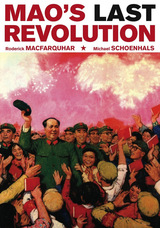
The Cultural Revolution was a watershed event in the history of the People’s Republic of China, the defining decade of half a century of communist rule. Before 1966, China was a typical communist state, with a command economy and a powerful party able to keep the population under control. But during the Cultural Revolution, in a move unprecedented in any communist country, Mao unleashed the Red Guards against the party. Tens of thousands of officials were humiliated, tortured, and even killed. Order had to be restored by the military, whose methods were often equally brutal.
In a masterly book, Roderick MacFarquhar and Michael Schoenhals explain why Mao launched the Cultural Revolution, and show his Machiavellian role in masterminding it (which Chinese publications conceal). In often horrifying detail, they document the Hobbesian state that ensued. The movement veered out of control and terror paralyzed the country. Power struggles raged among Lin Biao, Zhou Enlai, Deng Xiaoping, and Jiang Qing—Mao’s wife and leader of the Gang of Four—while Mao often played one against the other.
After Mao’s death, in reaction to the killing and the chaos, Deng Xiaoping led China into a reform era in which capitalism flourishes and the party has lost its former authority. In its invaluable critical analysis of Chairman Mao and its brilliant portrait of a culture in turmoil, Mao’s Last Revolution offers the most authoritative and compelling account to date of this seminal event in the history of China.

"In applying a realist approach to controversies over immigration, pornography, race relations, and the apparent communications gap between the genders, Wolfe seeks to demonstrate the advantages of combining the insights of criticism and the tools of social science."—Library Journal
"A plea for a return to liberal thinking, an insistence on the value of 'social criticism beyond politics.' "—Washington Post Book World
"[Wolfe] surveys contemporary public discourse on racial and sexual relations, welfare policy, immigration, pornography, education and cultural politics . . . he manages to bring some fresh thinking to most of these stale debates."—T. J. Jackson Lears, New York Times Book Review
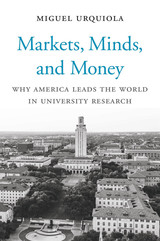
A colorful history of US research universities, and a market-based theory of their global success.
American education has its share of problems, but it excels in at least one area: university-based research. That’s why American universities have produced more Nobel Prize winners than those of the next twenty-nine countries combined. Economist Miguel Urquiola argues that the principal source of this triumph is a free-market approach to higher education.
Until the late nineteenth century, research at American universities was largely an afterthought, suffering for the same reason that it now prospers: the free market permits institutional self-rule. Most universities exploited that flexibility to provide what well-heeled families and church benefactors wanted. They taught denominationally appropriate materials and produced the next generation of regional elites, no matter the students’—or their instructors’—competence. These schools were nothing like the German universities that led the world in research and advanced training. The American system only began to shift when certain universities, free to change their business model, realized there was demand in the industrial economy for students who were taught by experts and sorted by talent rather than breeding. Cornell and Johns Hopkins led the way, followed by Harvard, Columbia, and a few dozen others that remain centers of research. By the 1920s the United States was well on its way to producing the best university research.
Free markets are not the solution for all educational problems. Urquiola explains why they are less successful at the primary and secondary level, areas in which the United States often lags. But the entrepreneurial spirit has certainly been the key to American leadership in the research sector that is so crucial to economic success.
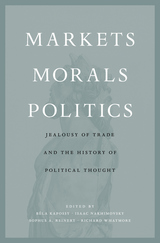
When István Hont died in 2013, the world lost a giant of intellectual history. A leader of the Cambridge School of Political Thought, Hont argued passionately for a global-historical approach to political ideas. To better understand the development of liberalism, he looked not only to the works of great thinkers but also to their reception and use amid revolution and interstate competition. His innovative program of study culminated in the landmark 2005 book Jealousy of Trade, which explores the birth of economic nationalism and other social effects of expanding eighteenth-century markets. Markets, Morals, Politics brings together a celebrated cast of Hont’s contemporaries to assess his influence, ideas, and methods.
Richard Tuck, John Pocock, John Dunn, Raymond Geuss, Gareth Stedman Jones, Michael Sonenscher, John Robertson, Keith Tribe, Pasquale Pasquino, and Peter N. Miller contribute original essays on themes Hont treated with penetrating insight: the politics of commerce, debt, and luxury; the morality of markets; and economic limits on state power. The authors delve into questions about the relationship between states and markets, politics and economics, through examinations of key Enlightenment and pre-Enlightenment figures in context—Hobbes, Rousseau, Spinoza, and many others. The contributors also add depth to Hont’s lifelong, if sometimes veiled, engagement with Marx.
The result is a work of interpretation that does justice to Hont’s influence while developing its own provocative and illuminating arguments. Markets, Morals, Politics will be a valuable companion to readers of Hont and anyone concerned with political economy and the history of ideas.

Yet these concepts, within a specifically Marxist framework, are not always easy to understand. This book is an ideal student introduction that explains, in clear and concise chapters, the precise meaning and implications of each of Marx's key concepts. Furthermore, the contributors show how these ideas continue to be relevant, and how they relate to modern society.
The contributors include leading academics in the field of politicial science. Outlining clearly what each concept means, they move on to situate it within cutting-edge contemporary political theory.
Concepts include historical materialism, capitalism, class, the state, imperialism, the division of labour, oppression, production and reproduction, revolution, working class internationalism, equality and democracy.
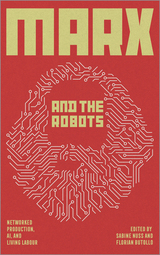
It covers a broad range of digital aspects now proliferating across our work and lives, including chapters on the digitalization of agriculture, robotics in the factory and the labor process on crowdworking platforms. It looks to how 20th century Marxist predictions of the 'workerless factory' are, or are not, coming true, and how 'Platform Capitalism' should be understood and critiqued.
Through rich empirical, theoretical and historical material, this book is necessary reading for those wanting a clear overview of our digital world.

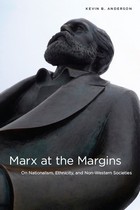
In Marx at the Margins, Kevin Anderson uncovers a variety of extensive but neglected texts by the well-known political economist which cast what we thought we knew about his work in a startlingly different light. Analyzing a variety of Marx’s writings, including journalistic work written for the New York Tribune, Anderson presents us with a Marx quite at odds with our conventional interpretations. Rather than providing us with an account of Marx as an exclusively class-based thinker, Anderson here offers a portrait of Marx for the twenty-first century: a global theorist whose social critique was sensitive to the varieties of human social and historical development, including not just class, but nationalism, race, and ethnicity, as well.
Marx at the Margins ultimately argues that alongside his overarching critique of capital, Marx created a theory of history that was multi-layered and not easily reduced to a single model of development or revolution. Through highly-informed readings on work ranging from Marx’s unpublished 1879–82 notebooks to his passionate writings about the antislavery cause in the United States, this volume delivers a groundbreaking and canon-changing vision of Karl Marx that is sure to provoke lively debate in Marxist scholarship and beyond.
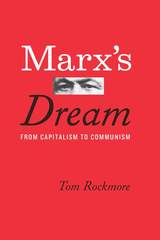
With Marx’s Dream, Tom Rockmore offers a much-needed alternative view, distinguishing rigorously between Marx and Marxism. Rockmore breaks with the Marxist view of Marx in three key ways. First, he shows that the concern with the relation of theory to practice—reflected in Marx’s famous claim that philosophers only interpret the world, while the point is to change it—arose as early as Socrates, and has been central to philosophy in its best moments. Second, he seeks to free Marx from his unsolicited Marxist embrace in order to consider his theory on its own merits. And, crucially, Rockmore relies on the normal standards of philosophical debate, without the special pleading to which Marxist accounts too often resort. Marx’s failures as a thinker, Rockmore shows, lie less in his diagnosis of industrial capitalism’s problems than in the suggested remedies, which are often unsound.
Only a philosopher of Rockmore’s stature could tackle a project this substantial, and the results are remarkable: a fresh Marx, unencumbered by doctrine and full of insights that remain salient today.


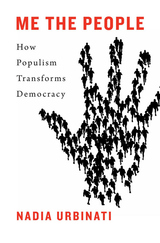
A timely and incisive assessment of what the success of populism means for democracy.
Populist movements have recently appeared in nearly every democracy around the world. Yet our grasp of this disruptive political phenomenon remains woefully inadequate. Politicians of all stripes appeal to the interests of the people, and every opposition party campaigns against the current establishment. What, then, distinguishes populism from run-of-the-mill democratic politics? And why should we be concerned by its rise?
In Me the People, Nadia Urbinati argues that populism should be regarded as a new form of representative government, one based on a direct relationship between the leader and those the leader defines as the “good” or “right” people. Populist leaders claim to speak to and for the people without the need for intermediaries—in particular, political parties and independent media—whom they blame for betraying the interests of the ordinary many. Urbinati shows that, while populist governments remain importantly distinct from dictatorial or fascist regimes, their dependence on the will of the leader, along with their willingness to exclude the interests of those deemed outside the bounds of the “good” or “right” people, stretches constitutional democracy to its limits and opens a pathway to authoritarianism.
Weaving together theoretical analysis, the history of political thought, and current affairs, Me the People presents an original and illuminating account of populism and its relation to democracy.
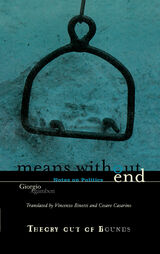
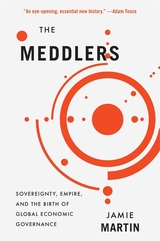
“The Meddlers is an eye-opening, essential new history that places our international financial institutions in the transition from a world defined by empire to one of nation states enmeshed in the world economy.”
—Adam Tooze, Columbia University
An award-winning history traces the origins of global economic governance—and the political conflicts it generates—to the aftermath of World War I.
International economic institutions like the International Monetary Fund and World Bank exert incredible influence over the domestic policies of many states. These institutions date from the end of World War II and amassed power during the neoliberal era of the late twentieth century. But as Jamie Martin shows, if we want to understand their deeper origins and the ideas and dynamics that shaped their controversial powers, we must turn back to the explosive political struggles that attended the birth of global economic governance in the early twentieth century.
The Meddlers tells the story of the first international institutions to govern the world economy, including the League of Nations and Bank for International Settlements, created after World War I. These institutions endowed civil servants, bankers, and colonial authorities from Europe and the United States with extraordinary powers: to enforce austerity, coordinate the policies of independent central banks, oversee development programs, and regulate commodity prices. In a highly unequal world, they faced a new political challenge: was it possible to reach into sovereign states and empires to intervene in domestic economic policies without generating a backlash?
Martin follows the intense political conflicts provoked by the earliest international efforts to govern capitalism—from Weimar Germany to the Balkans, Nationalist China to colonial Malaya, and the Chilean desert to Wall Street. The Meddlers shows how the fraught problems of sovereignty and democracy posed by institutions like the IMF are not unique to late twentieth-century globalization, but instead first emerged during an earlier period of imperial competition, world war, and economic crisis.
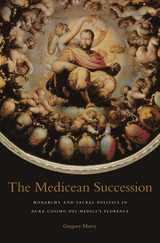
In 1537, Florentine Duke Alessandro dei Medici was murdered by his cousin and would-be successor, Lorenzino dei Medici. Lorenzino's treachery forced him into exile, however, and the Florentine senate accepted a compromise candidate, seventeen-year-old Cosimo dei Medici. The senate hoped Cosimo would act as figurehead, leaving the senate to manage political affairs. But Cosimo never acted as a puppet. Instead, by the time of his death in 1574, he had stabilized ducal finances, secured his borders while doubling his territory, attracted an array of scholars and artists to his court, academy, and universities, and, most importantly, dissipated the perennially fractious politics of Florentine life.
Gregory Murry argues that these triumphs were far from a foregone conclusion. Drawing on a wide variety of archival and published sources, he examines how Cosimo and his propagandists successfully crafted an image of Cosimo as a legitimate sacral monarch. Murry posits that both the propaganda and practice of sacral monarchy in Cosimo's Florence channeled preexisting local religious assumptions as a way to establish continuities with the city's republican and renaissance past. In The Medicean Succession, Murry elucidates the models of sacral monarchy that Cosimo chose to utilize as he deftly balanced his ambition with the political sensitivities arising from existing religious and secular traditions.

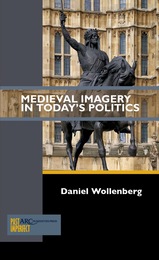
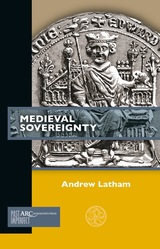


Meltdown Expected tells the story of the power shifts from late 1978 through 1979 whose repercussions are still being felt. Iran’s revolution led to a hostage crisis while neighbouring Afghanistan became the site of a proxy war between the USSR and the US, who supplied aid to Islamic mujahideen fighters that would later form the Taliban. Meanwhile, as tragedies like the Jonestown mass suicide and the assassination of Harvey Milk captured the nation’s attention, the government quietly reasserted and expanded the FBI’s intelligence powers. Drawing from recently declassified government documents and covering everything from Three Mile Island to the rise of punk rock, Aaron J. Leonard paints a vivid portrait of a tumultuous yet pivotal time in American history.
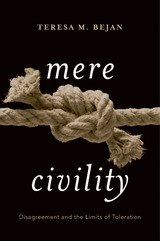
A New Statesman Best Book of the Year
A Church Times Book of the Year
We are facing a crisis of civility, a war of words polluting our public sphere. In liberal democracies committed to tolerating active, often heated disagreement, the loss of this virtue appears critical.
Most modern appeals to civility follow arguments by Hobbes or Locke by proposing to suppress disagreement or exclude views we deem “uncivil” for the sake of social harmony. By comparison, mere civility—a grudging conformity to norms of respectful behavior—as defended by Rhode Island’s founder, Roger Williams, might seem minimal and unappealing. Yet Teresa Bejan argues that Williams’s outlook offers a promising path forward in confronting our own crisis, one that challenges our fundamental assumptions about what a tolerant—and civil—society should look like.
“Penetrating and sophisticated.”
—James Ryerson, New York Times Book Review
“Would that more of us might learn to look into the past with such gravity and humility. We might end up with a more (or mere) civil society, yet.”
—Los Angeles Review of Books
“A deeply admirable book: original, persuasive, witty, and eloquent.”
—Jacob T. Levy, Review of Politics
“A terrific book—learned, vigorous, and challenging.”
—Alison McQueen, Stanford University
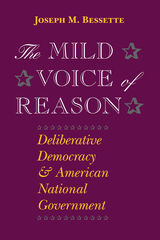
Drawing on original research, case studies of policymaking in Congress, and portraits of American lawmakers, Bessette demonstrates not only the limitations of nondeliberative explanations for how laws are made but also the continued vitality of genuine reasoning on the merits of public policy. Bessette discusses the contributions of the executive branch to policy deliberation, and looks at the controversial issue of the proper relationship of public opinion to policymaking.
Informed by Bessette's nine years of public service in city and federal government, The Mild Voice of Reason offers important insights into the real workings of American democracy, articulates a set of standards by which to assess the workings of our governing institutions, and clarifies the forces that promote or inhibit the collective reasoning about common goals so necessary to the success of American democracy.
"No doubt the best-publicized recent book-length work on Congress is columnist George Will's diatribe in praise of term limits in which the core of his complaint is that Congress does not deliberate in its decision-making. Readers who are inclined to share that fantasy would do well to consult the work of Joseph M. Bessette. He turns up massive amounts of material attesting to the centrality of deliberation in congressional life."—Nelson W. Polsby, Presidential Studies Quarterly
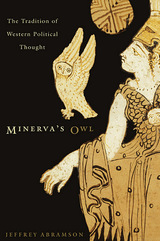
Informal in tone yet serious in content, this book serves as a lively and accessible guide for readers discovering the tradition of political thought that dates back to Socrates and Plato. Because the arguments of the great philosophers are nearly eternal, even those long schooled on politics will find that this book calls on recurring questions about morality and power, justice and war, the risk of democracy, the necessity for evil, the perils of tolerance, and the meaning of happiness. Jeffrey Abramson argues politics with the classic writers and draws the reader into a spirited conversation with contemporary examples that illustrate the enduring nature of political dilemmas. As the discussions deepen, the voices of Abramson’s own teachers, and of the students he has taught, enter into the mix, and the book becomes a tribute not just to the great philosophers but also to the special bond between teacher and student.
As Hegel famously noted, referring to the Roman goddess Minerva, her owl brought back wisdom only at dusk, when it was too late to shine light on actual politics. Abramson reminds us that there are real political problems to confront, and in a book filled with grace and passion, he captures just how exciting serious learning can be.

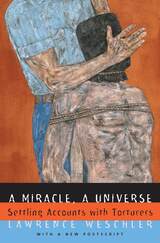
"Disturbing and often enthralling."—New York Times Book Review
"Extraordinarily moving. . . . Weschler writes brilliantly."—Newsday
"Implausible, intricate and dazzling."—Times Literary Supplement
"As Weschler's interviewees told their tales, I paced agitatedly, choked back tears. . . . Weschler narrates these two episodes with skill and tact. . . . An inspiring book."—George Scialabba, Los Angeles Weekly
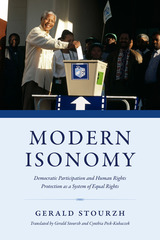
The ideal, Stourzh argues, is a state, and indeed a world, in which individual rights, including the right to participate in politics equally, are clearly defined and possessed by all. Stourzh begins with ancient Greek thought contrasting isonomy—which is associated with the rule of the many—with “gradated societies,” oligarchies, and monarchies. He then discusses the American experiment with the development of representative democracy as well as the French Revolution, which proclaimed that all people are born and remain free and with equal rights. But progress on the creation and protection of rights for all has been uneven. Stourzh discusses specifically the equalization of slaves, peasants, women, Jews, and indigenous people. He demonstrates how deeply intertwined the protection of equal rights is with the development of democracy and gives particular attention to the development of constitutional adjudication, notably the constitutional complaint of individuals. He also discusses the international protection human rights. Timely and thought-provoking, Modern Isonomy is an erudite exploration of political and human rights.
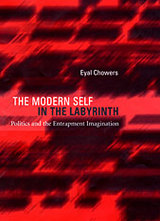
This book explores the distinct historical-political imagination of the self in the twentieth century and advances two arguments. First, it suggests that we should read the history of modern political philosophy afresh in light of a theme that emerges in the late eighteenth century: the rift between self and social institutions. Second, it argues that this rift was reformulated in the twentieth century in a manner that contrasts with the optimism of nineteenth-century thinkers regarding its resolution. It proposes a new political imagination of the twentieth century found in the works of Weber, Freud, and Foucault, and characterizes it as one of "entrapment."
Eyal Chowers shows how thinkers working within diverse theoretical frameworks and fields nevertheless converge in depicting a self that has lost its capacity to control or transform social institutions. He argues that Weber, Freud, and Foucault helped shape the distinctive thought and culture of the past century by portraying a dehumanized and distorted self marked by sameness. This new political imagination proposes coping with modernity through the recovery, integration, and assertion of the self, rather than by mastering and refashioning collective institutions.

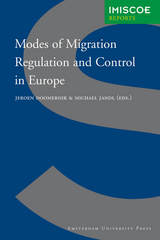
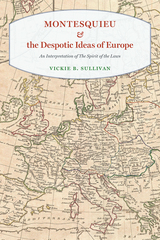
Nowhere is Montesquieu’s critique of the despotic ideas of Europe more powerful than in his enormously influential The Spirit of the Laws, and Vickie B. Sullivan guides readers through Montesquieu’s sometimes veiled, yet sharply critical accounts of Machiavelli, Hobbes, Aristotle, and Plato, as well as various Christian thinkers. He finds deleterious consequences, for example, in brutal Machiavellianism, in Hobbes’s justifications for the rule of one, in Plato’s reasoning that denied slaves the right of natural defense, and in the Christian teachings that equated heresy with treason and informed the Inquisition.
In this new reading of Montesquieu’s masterwork, Sullivan corrects the misconception that it offers simple, objective observations, showing it instead to be a powerful critique of European politics that would become remarkably and regrettably prescient after Montesquieu’s death when despotism wound its way through Europe.
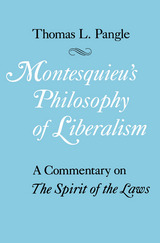
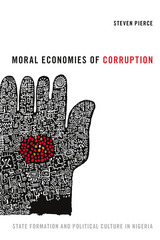
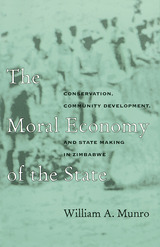
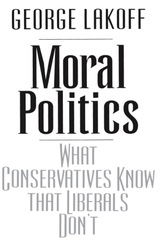
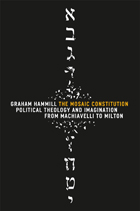
It is a common belief that scripture has no place in modern, secular politics. Graham Hammill challenges this notion in The Mosaic Constitution, arguing that Moses’s constitution of Israel, which created people bound by the rule of law, was central to early modern writings about government and state.
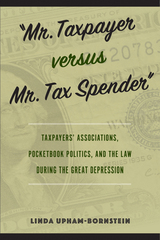
“Mr. Taxpayer versus Mr. Tax Spender” presents a comprehensive overview of these grassroots taxpayers’ leagues beginning in the 1860s and shows how they evolved during their heyday in the 1930s. Linda Upham-Bornstein chronicles the ways these taxpayers associations organized as well as the tools they used—constructive economy, political efforts, tax strikes, and tax revolt through litigation—to achieve their objectives.
Taxpayer activity was a direct consequence of—and a response to—the economic crisis of the Great Depression and the expansion of the size and scope of government. “Mr. Taxpayer versus Mr. Tax Spender” connects collective tax resistance in the 1930s to the populist tradition in American politics and to other broad impulses in American political and legal history.
READERS
Browse our collection.
PUBLISHERS
See BiblioVault's publisher services.
STUDENT SERVICES
Files for college accessibility offices.
UChicago Accessibility Resources
home | accessibility | search | about | contact us
BiblioVault ® 2001 - 2024
The University of Chicago Press









